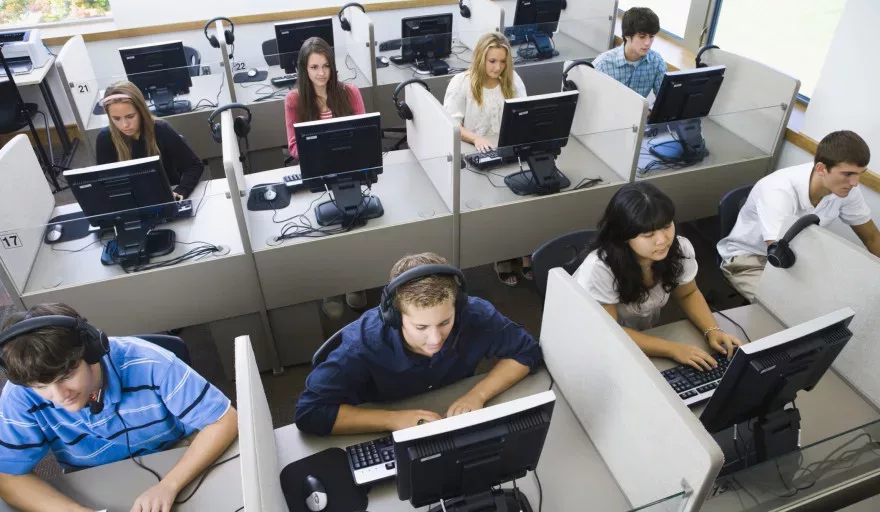With 25% of adults in the European Union lacking the necessary digital skills to effectively use information and communication technologies, according to a report by the Organisation for Economic Cooperation and Development (OECD) published in autumn 2013, the European Commission is facing various challenges in order to bridge the competitive gap with the rest of the world, Euractiv reports.
On top of the differences with third countries, broad disparities are found between EU member states themselves, the study showed with countries like Spain, Italy or Poland where almost one adult in five has no computer experience. Age disparities were also detected with high school pupils having sometimes better skills than higher education graduates.
From the lack of access to digital equipment in schools and higher education institutions to the lack of access to open education resources and effective e-skills, the European Commission has identified a number of priorities for the coming years through its ‘Opening up Education’ strategy.
Digital Divide
A study by the Commission on ICT in education also showed dramatic results in EU countries: between 50% and 80% of students never use digital textbooks or exercise software while 70% of teachers are asking for training to improve their digital skills. And while more than 90% of pupils are likely to have internet access at school, the number drops to 45% in Croatia and Greece.
In an attempt to reduce the digital divide looming over Europe, commissioners Neelie Kroes in charge of the digital agenda and Androulla Vassiliou, responsible for education, launched the joint long-term initiative ‘Opening up Educaiton’ in September last year.
“The aim of the strategy is to encourage member states to invest time and money in training students and teachers but also the use of free to use education resources,” Dennis Abbott, spokesperson for commissioner Vassiliou explains. E-skills in higher education will have to become a priority if Europe is to fight against unemployment and remain competitive at a global level, experts warn.
As researchers from the Belgian university KUL stressed in a study recently, high-tech education is increasingly becoming key in every single aspect of society, meaning that “policy-makers will have to focus on providing the population with the required high-tech education and not just in STEM occupations,” which also means that life-long learning will become indispensable. “Retraining will have to happen several times in the course of a career,” one of the authors, Maarten Goos, said.
When launching the “Opening op Education” strategy, Vassiliou noted: “It’s not enough to understand how to use an app or program; we need youngsters who can create their own programs. Opening up Education is about opening minds to new learning methods so that our people are more employable, creative, innovative and entrepreneurial.”
But because disparities are so wide between member states and the European Commission does not have much of a say in educational policies, which are entirely in the hands of national government, the only way to push them to do more, Vassiliou’s spokesman said, is the good old “naming and shaming” tool, by publishing surveys and studies in which the worst performers would feel pushed into a race to the top.
Open Educational Resources
Another feature of the new European digital strategy focuses on making education content freely available, “while ensuring authors’ rights are respected”, the Commission spokesman assured.
When the idea was launched, the Commission who is tabling on a significant rise of students in higher education in the next decade, the need for online learning possibilities such as the ‘ Massive Open Online Courses’ (MOOCs) is seen as a priority, to “allow individuals to access education anywhere, anytime and through any device. But many universities are not ready for this change,” Commissioner Vassiliou’s statement read.
For the Commissioner, skills are as important as equal access to educational content, Abbott added.
“She is not advocating that everything should be free but it should be made free to the final user and the authors properly remunerated.”
But open educational resources are not just a recommendation from the Commission, they will also be treated as criteria to get EU funding for education digitalisation projects, Abbott explained.
“It’s a deal, you want the money, you have to have open educational resources.”
Funding
The Commission is putting a number of funds at the disposal of EU member states to help them reach the aforementioned objectives on training, learning and equipping education institutions, students and teachers, such as Erasmus+, Horizon 2020 and the European structural funds. “All educational materials supported by Erasmus+ will be freely available to the public under open licences,” the rules state.
“The EU can provide a lot of funding in training, the key issue is telling member states they have to take it seriously to remain competitive. Higher education is a super-competitive area worldwide, it’s about attracting the best students, the best teachers,” the spokesman said.
Member states will have to apply for the money available from all of these sources, having in mind that Erasmus+ is one of the rare programmes which got a 40% increase in an overall smaller European budget, Abbott reminds.
Commenting on the fact that the Commission will not be able to do much more on advancing the state of digitalisation of higher education than this, let alone any kind of harmonisation, the spokesperson explains that such strategy is “the result of consultations with member states,” and results can already be seen in certain countries.
“‘Opening Up Slovenia’ is a model at EU level,” Abbott says.
The project was launched earlier in April in the capital Ljubljana with the aim of “creating an open educational system in parallel to the formal one, and to exploit all aspects of open education.”
“For example, it will encourage rigorous, transparent and replicable testing of open learning environments, open education theories, new business models, open education computational tools, and new and emerging technologies in the educational technologies market-place,” the Commission said at the launch of the event.
The platform involves all Slovenian universities and other educational institutions. In other words, the project is exactly what the Commission want to see in other member states in terms of priorities.
SOURCE: http://www.euractiv.com/sections/eskills-growth/boosting-e-skills-european-higher-education-requires-political-will-national



































